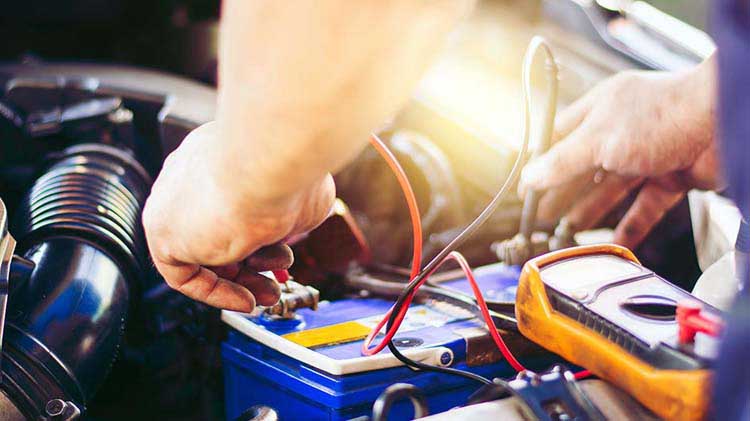How to Use Lithium Batteries in Military Equipment
Introduktion
In recent years, the advancements in technology have revolutionized various sectors, including the military. One significant development is the application of lithium batteries in military equipment. Lithium batteries have become the preferred choice due to their high energy density, lightweight nature, and extended lifespan. This article aims to discuss the advancements of lithium batteries in military equipment, highlighting their benefits and potential challenges.
Advantages of Lithium Batteries
1. High Energy Density: Lithium batteries possess a higher energy density compared to traditional batteries. This means they can store more energy in a smaller size, allowing military equipment to operate for longer durations without needing frequent battery replacements. The high energy density of lithium batteries is crucial for soldiers who rely on devices such as night vision goggles, communication systems, and GPS devices during missions.
2. Lightweight and Portable: The lightweight nature of lithium batteries is a significant advantage for military personnel. Carrying heavy equipment can be burdensome and may hinder mobility. Lithium batteries offer a lightweight alternative, reducing the load on soldiers while ensuring a reliable power source. This is particularly beneficial for soldiers engaged in long-range missions, where every ounce counts.
3. Extended Lifespan: Traditional batteries tend to degrade over time, leading to reduced performance. Lithium batteries, on the other hand, have a longer lifespan and can withstand numerous charge-discharge cycles. This characteristic is vital for military applications, as equipment often endures harsh conditions and prolonged use. The extended lifespan of lithium batteries ensures that soldiers can rely on their equipment without interruptions caused by battery failures.
4. Rapid Recharge: Lithium batteries have the advantage of being able to recharge quickly. This eliminates the need for soldiers to carry numerous spare batteries during missions. With rapid recharge capabilities, military personnel can recharge their batteries swiftly, ensuring a continuous power supply for their equipment. This saves valuable time and resources and allows soldiers to focus on their mission objectives.
Applications in Military Equipment
1. Portable Communication Systems: Reliable communication is critical for military operations. Lithium batteries power portable communication systems, including radios and satellite phones, ensuring soldiers can maintain constant contact with their units and receive vital information in real-time. The lightweight and long-lasting nature of lithium batteries make them ideal for these applications.
2. Soldier Wearable Technology: Modern military equipment includes wearable technology such as body cameras, helmet-mounted displays, and augmented reality devices. These devices require lightweight, high-capacity batteries to function effectively. Lithium batteries fulfill these requirements, allowing soldiers to operate with enhanced situational awareness and improved communication capabilities.
3. Unmanned Aerial Vehicles (UAVs): UAVs have become an integral part of military operations. These drones require a reliable and lightweight power source to carry out surveillance, reconnaissance, and combat missions. Lithium batteries provide the necessary power for UAVs while minimizing weight and allowing for extended flight durations.

Challenges and Future Developments
While lithium batteries offer numerous advantages, they also present some challenges for military applications. The main challenge is the risk of thermal runaway and potential fire hazards. Lithium batteries, if not properly managed, can overheat and catch fire. To mitigate these risks, robust safety protocols and advanced battery management systems must be implemented.
In the future, advancements in lithium battery technology will focus on improving energy density, increasing lifespan, and reducing environmental impacts. Research is underway to develop solid-state lithium batteries that eliminate the need for flammable electrolytes, further enhancing safety. Additionally, nanotechnology may be employed to increase the energy density of lithium batteries, allowing for even smaller and lighter military equipment.
Konklusion
The advancements of lithium batteries in military equipment have significantly transformed the capabilities of soldiers on the battlefield. With their high energy density, lightweight nature, extended lifespan, and rapid recharge capabilities, lithium batteries have become indispensable for powering various military devices. As technology continues to evolve, further improvements in lithium battery technology will continue to enhance military operations, ensuring soldiers have reliable and efficient power sources for their equipment.
-
 In the world of locomotives, the starter battery is an essential component that powers up the engine. It acts as a source of energy that delivers the initial burst of power needed to start the engine and keep it running. Locomotives are heavy-duty machines that require a lot of power to operate, and the starter battery plays a crucial role...Læs mere
In the world of locomotives, the starter battery is an essential component that powers up the engine. It acts as a source of energy that delivers the initial burst of power needed to start the engine and keep it running. Locomotives are heavy-duty machines that require a lot of power to operate, and the starter battery plays a crucial role...Læs mere -
 In recent years, there has been a growing concern about the need to transition towards cleaner and more sustainable sources of energy. With the increasing demand for electricity and the urgency to reduce greenhouse gas emissions, the energy industry has been forced to explore new technologies and innovations. Two of the most promising advancements that are revolutionizing the energy industry...Læs mere
In recent years, there has been a growing concern about the need to transition towards cleaner and more sustainable sources of energy. With the increasing demand for electricity and the urgency to reduce greenhouse gas emissions, the energy industry has been forced to explore new technologies and innovations. Two of the most promising advancements that are revolutionizing the energy industry...Læs mere -
 Lithium batteries are a type of rechargeable battery that have gained popularity in recent years due to their high energy density, long cycle life, and low self-discharge rate. They are used in a wide range of applications, from powering electronic devices to electric vehicles and renewable energy systems. In this article, we will explore the benefits of lithium batteries and...Læs mere
Lithium batteries are a type of rechargeable battery that have gained popularity in recent years due to their high energy density, long cycle life, and low self-discharge rate. They are used in a wide range of applications, from powering electronic devices to electric vehicles and renewable energy systems. In this article, we will explore the benefits of lithium batteries and...Læs mere -
 In today's fast-paced and technology-driven world, industries heavily rely on batteries to power their operations. Whether it is forklifts in warehouses, cranes in construction sites, or electric vehicles on the road, industrial batteries play a critical role in ensuring smooth and uninterrupted workflow. However, to unleash the full potential of these batteries, it is crucial to have efficient and powerful...Læs mere
In today's fast-paced and technology-driven world, industries heavily rely on batteries to power their operations. Whether it is forklifts in warehouses, cranes in construction sites, or electric vehicles on the road, industrial batteries play a critical role in ensuring smooth and uninterrupted workflow. However, to unleash the full potential of these batteries, it is crucial to have efficient and powerful...Læs mere -
 In the world of renewable energy, the search for reliable and long-lasting power sources is always ongoing. One such power source that has been gaining popularity in recent years is the 100Ah 12V LiFePO4 battery. This type of battery is considered to be a breakthrough in battery technology due to its advantages over traditional lead-acid batteries. The 100Ah 12V...Læs mere
In the world of renewable energy, the search for reliable and long-lasting power sources is always ongoing. One such power source that has been gaining popularity in recent years is the 100Ah 12V LiFePO4 battery. This type of battery is considered to be a breakthrough in battery technology due to its advantages over traditional lead-acid batteries. The 100Ah 12V...Læs mere -
 Introduction Batteries are an essential part of any vehicle. They provide the power needed for the engine to start, as well as for various electrical components in the car. Over the years, advancements in technology have led to the development of different types of batteries. One such type is the lithium starter battery, which has several advantages over traditional...Læs mere
Introduction Batteries are an essential part of any vehicle. They provide the power needed for the engine to start, as well as for various electrical components in the car. Over the years, advancements in technology have led to the development of different types of batteries. One such type is the lithium starter battery, which has several advantages over traditional...Læs mere -
 The LiFePO4 battery, also known as the lithium iron phosphate battery, is a type of rechargeable battery that has been gaining popularity in recent years. Unlike traditional lead-acid batteries, LiFePO4 batteries are much lighter, more efficient, and have a longer lifespan. One of the main benefits of LiFePO4 batteries is their high energy density. This means that they can...Læs mere
The LiFePO4 battery, also known as the lithium iron phosphate battery, is a type of rechargeable battery that has been gaining popularity in recent years. Unlike traditional lead-acid batteries, LiFePO4 batteries are much lighter, more efficient, and have a longer lifespan. One of the main benefits of LiFePO4 batteries is their high energy density. This means that they can...Læs mere

